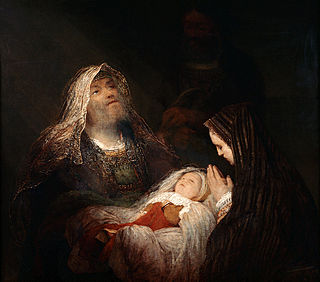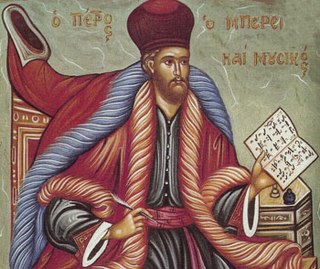A doxology is a short hymn of praises to God in various forms of Christian worship, often added to the end of canticles, psalms, and hymns. The tradition derives from a similar practice in the Jewish synagogue, where some version of the Kaddish serves to terminate each section of the service.

The Nunc dimittis, also known as the Song of Simeon or the Canticle of Simeon, is a canticle taken from the second chapter of the Gospel of Luke, verses 29 through 32. Its Latin name comes from its incipit, the opening words, of the Vulgate translation of the passage, meaning "Now let depart". Since the 4th century it has been used in services of evening worship such as Compline, Vespers, and Evensong.

Phthora nenano is the name of one of the two "extra" modes in the Byzantine Octoechos—an eight mode system, which was proclaimed by a synod of 792. The phthorai nenano and nana were favoured by composers at the Monastery Agios Sabas, near Jerusalem, while hymnographers at the Stoudiou-Monastery obviously preferred the diatonic mele.
Echos is the name in Byzantine music theory for a mode within the eight-mode system (oktoechos), each of them ruling several melody types, and it is used in the melodic and rhythmic composition of Byzantine chant, differentiated according to the chant genre and according to the performance style. It is akin to a Western medieval tonus, an Andalusian tab', an Arab naġam, or a Persian parde.
In literature, the deuteragonist or secondary main character is the second most important character of a narrative, after the protagonist and before the tritagonist. The deuteragonist often acts as a constant companion to the protagonist or someone who continues actively aiding a protagonist. The deuteragonist may switch between supporting and opposing the protagonist, depending on their own conflict or plot.

Solemn Mass is the full ceremonial form of the Tridentine Mass, celebrated by a priest with a deacon and a subdeacon, requiring most of the parts of the Mass to be sung, and the use of incense. It is also called High Mass or Solemn High Mass. However, in the United States the term "High Mass" is also used to describe the less elaborate Missa Cantata, which lacks deacon and subdeacon and some of the ceremonies connected with them.

A Christian burial is the burial of a deceased person with specifically Christian rites; typically, in consecrated ground. Until recent times Christians generally objected to cremation because it interfered with the concept of the resurrection of a corpse, and practiced inhumation almost exclusively. Today this opposition has all but vanished among Protestants and Catholics alike, and this is rapidly becoming more common, although Eastern Orthodox Churches still mostly forbid cremation.
The Communion is a refrain sung with psalm recitation during the distribution of the Eucharist in the Divine Liturgy or Mass. As chant it was connected with the ritual act of Christian communion.

The Gospel in Christian liturgy refers to a reading from the Gospels used during various religious services, including Mass or Divine Liturgy (Eucharist). In many Christian churches, all present stand when a passage from one of the Gospels is read publicly, and sit when a passage from a different part of the Bible is read. The reading of the Gospels, often contained in a liturgical edition containing only the four Gospels, is traditionally done by a minister, priest or deacon, and in many traditions the Gospel Book is brought into the midst of the congregation to be read.
Eastern Orthodox worship in this article is distinguished from Eastern Orthodox prayer in that 'worship' refers to the activity of the Christian Church as a body offering up prayers to God while 'prayer' refers to the individual devotional traditions of the Orthodox.
The Polychronion is a solemn encomium chanted in the liturgy of the Eastern Orthodox Church and those Eastern Catholic Churches which follow the Byzantine Rite. In the Catholic rite, it is the equivalent of the liturgical acclamation Ad multos annos.

The entrance prayers are the prayers recited by the deacon and priest upon entering the temple before celebrating the Divine Liturgy in the Eastern Orthodox Church and those Eastern Catholic Churches which follow the Byzantine Rite.
The Dismissal is the final blessing said by a Christian priest or minister at the end of a religious service. In liturgical churches the dismissal will often take the form of ritualized words and gestures, such as raising the minister's hands over the congregation, or blessing with the sign of the cross. The use of a final blessing at the end of a liturgical service may be based upon the Priestly Blessing prescribed for the kohanim in the Torah.
The Cherubikon is the usual Cherubic Hymn sung at the Great Entrance of the Byzantine liturgy. The hymn symbolically incorporates those present at the liturgy into the presence of the angels gathered around God's throne.

Let all mortal flesh keep silence, also known as Let all mortal flesh keep silent, is an ancient chant of Eucharistic devotion based on words from Habakkuk 2:20, "Let all the earth keep silence before him" and Zechariah 2:13, "Be silent, all flesh, before the LORD; for he has roused himself from his holy dwelling". The original was composed in Greek as a Cherubic Hymn for the Offertory of the Divine Liturgy of St James; it probably antedates the rest of the liturgy and goes back at least to AD 275, with local churches adopting arrangements in Syriac. In modern times, the Ralph Vaughan Williams arrangement of a translation from the Greek by Gerard Moultrie to the tune of "Picardy", a French medieval folk melody, popularized the hymn among other Christian congregations.

Petros Bereketis or Peter the Sweet was one of the most innovative musicians of 17th-century Constantinople. He, together with Panagiotes the New Chrysaphes, Balasios the Priest and Germanos Bishop of New Patras was one of the most influential figures in the evolution of the Byzantine psaltic art following the fall of Constantinople in 1453, although he never was associated with the Patriarchate in Fener. For many years, he served as the protopsaltis of church St. Constantine of the Hypsomatheia district close to the Marmara coast.
Mnohaya lita is a traditional Ukrainian celebratory song. The song is based on both the Greek: Εις πολλά έτη Eis polla etē and on the Byzantine Rite polychronion or the hierarchical acclamation Ton Despotin, which is normally sung at the end of church services. The song is also sung at informal gatherings and at formal events, such as weddings, church events or other celebrations.

Oktōēchos is the name of the eight mode system used for the composition of religious chant in Byzantine, Syriac, Armenian, Georgian, Latin and Slavic churches since the Middle Ages. In a modified form the octoechos is still regarded as the foundation of the tradition of monodic Orthodox chant today.
Ad multos annos is a Latin acclamation for celebrations, and also a hymn used in the rites of the Catholic Church.